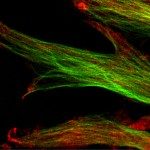Lien vers Pubmed [PMID] – 8586173
Dev. Biol. Stand. 1995;85:183-93
The genes for streptokinase, the most important prokaryotic plasmingoen activator, exhibit allelic variation predominantly due to the polymorphism of an internal 220-base pair fragment that divides the phylogenetic tree of their products into two primary branches. Current molecular genetic research seeks functional correlates of the allelic variation, aims at analyzing the genomic environment of the streptokinase gene, skc, and focuses on understanding its expression. Of the six genes cloned and sequenced in the skc region of Streptococcus equisimilis H46A, skc is expressed most abundantly in a fashion that involves two overlapping core promoters and upstream sequences rich of AT tracts. Transcription of skc is terminated at a hypersymmetrical site that functions bidirectionally and prevents convergent transcription of the oppositely oriented skc and rel-orf1 genes whose mRNA abundance differs by a factor of at least three orders of magnitude.

